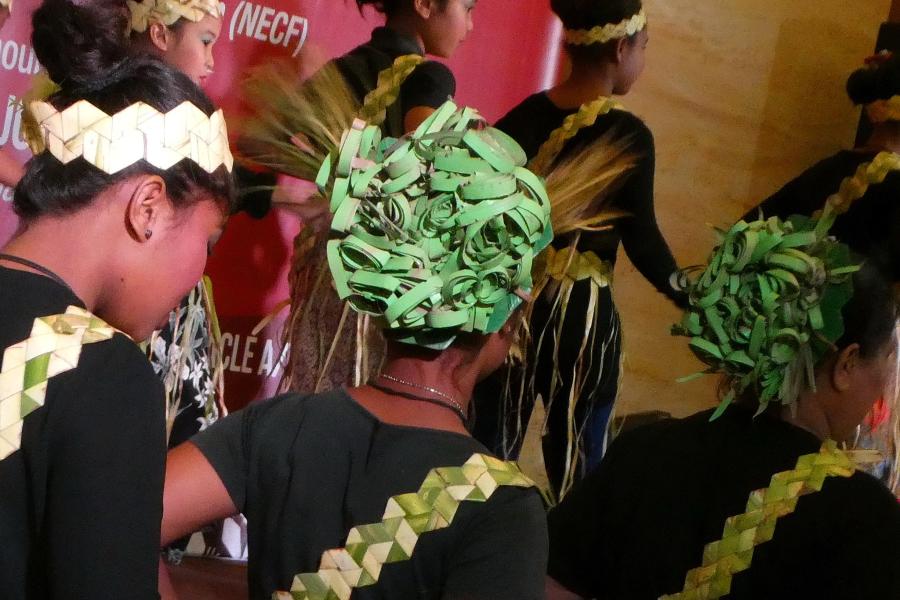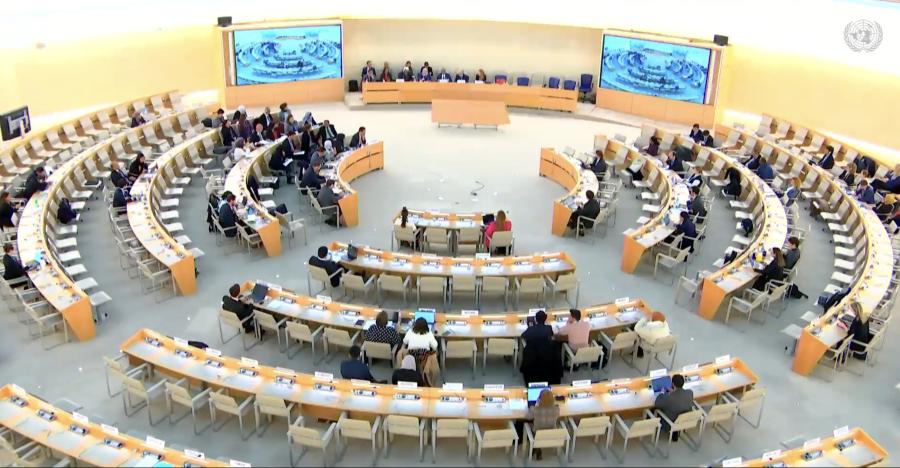Development and egalitarian sex roles
The Batek De' Negritos are one or-several aboriginal people, called Orang Asli, living an unassimilated life in Malaysia. Numbering about 350, the Batek De' (hereafter simply Batek) live in camps of five or six nuclear families in the rain forest regions of the state of Kelantan. They maintain themselves by hunting, gathering, and trading forest products.
In the past, the reaction of the Batek to such outside incursions as the settlement of Malay farmers in neighboring areas was to remove themselves to the deeper reaches of the forest as much as possible, while taking advantage of the trade opportunities presented by the proximity of the Malays. Until recently contact between the Batek and outsiders occurred largely on an individual basis, with individual Malay farmers living along the main rivers of the area. Since the 1960s, contact with outsiders has been increasingly the result of government policies and programs. Much of the forest area inhabited by the Batek is currently being logged to make way for rubber and palm oil plantations and for land development schemes intended to provide family plots for landless Malay farmers.
The government, through the Department of Aboriginal Affairs (Jabatan Hal Ehwal Orang Asli, abbreviated JOA) has been attempting to induce the Batek to give up their nomadic life, to settle down and take up swidden agriculture which the JOA appears to sincerely believe is a great step up for them. Under the settlement schemes, the Batek are given tools, seeds, rations, and technical assistance to induce them to clear fields and plant crops. Except at one location on the lower Lebir River, Kumpung Machang, these schemes have only temporarily achieved their aim. Generally the Batek participate in them only until the rations run out or become insufficient, usually even before the planting is completed. They then return to the forest and resume their nomadic foraging.
The Batek value the freedom afforded by the foraging way of life; they are able to move when and where they wish and engage in any of a number of economic activities. The problem they will increasingly be forced to face, however, is that the logging operations and development schemes to which the Malaysian government is committed are rapidly reducing the amount of virgin forest left in Kelantan that can support the hunting and gathering lifestyle the Batek prefer.
Relations Between the Sexes
The Batek are one of several hunting and gathering peoples in the world whose male-female relations are highly egalitarian. This is in large part due to the fact that both women and men in these societies procure and share food. While the daily food-getting responsibilities of the sexes differ - women normally gather vegetable foods and men concentrate on hunting - the contributions of each sex to the food supply are considered equally important by the Batek, and each individual has direct and equal access to the sharing network that distributes food in a camp. The Batek have no rigid rules separating the activities of the sexes; thus women who want to hunt may do so (few do, however) and men gather tubers and other plant foods whenever they want. Both women and men engage in collecting and trading rattan, which is the main cash-producing activity, and both sexes participate in agricultural activities when the Batek agree to join one of the government's schemes.
The egalitarian structure of their economic production and consumption is matched by the egalitarian nature of marriage among the Batek. Men and women choose their own spouses on the basis of affection and compatibility. The family operates as an autonomous economic unit, the husband and wife making joint decisions about food-getting activities and camp movements. The sexes live highly integrated lives among the Batek, often working together and spending their leisure hours together. Spouses tend to be true companions as well as co-workers. If the companionship breaks down, either spouse may initiate divorce. Women as well as men can manage on their own after a divorce because they can depend on the camp sharing network to round out their food supply; each sex can build shelters, and others in camp will help with child care.
There are no formal leaders among the Batek. The JOA has designated certain men as "headmen" (penghulu), but these supposed spokesmen have no special authority among the Batek themselves. All individuals are free to make their own decisions about activities, moves, what camps to join, and the like. If their decisions match the wishes of other camp members, people remain together in a camp and work with one another; if not, people regroup in different areas and perform different activities. Some individuals, because of their wisdom, experience, or force of personality, are looked to for guidance in such matters. These "natural leaders" may be men or women.
Batek cultural and religious beliefs convey the idea that women and men play equal roles in the proper order of the world. Gender differences are not culturally imbued with discriminatory, asymmetrical symbolic messages. Egalitarian sex relations are, in short, an integral part of Batek life.
Effects of Outside Contacts
Thus far, contact with the Malays has been approached by the Batek in much the same way as they approach their traditional foraging life: both sexes have directly participated in the economic activities made possible by contact. Batek women as well as men have worked for Malays as agricultural laborers and have collected and traded forest products. Some Batek women have accompanied men to Malay towns to trade and buy goods, and many more have had direct contact with the Malay traders who periodically seek out the Batek in the forest. Some economic opportunities, however, are exploited predominantly by men. These include activities that require extended absence from camp (e.g., collecting highly valuable gaharu wood, which is used for incense) and those that are done together with Malays (Batek men sometimes work as guides). But because the proceeds of such work are shared widely, like the proceeds of hunting and gathering, participating men do not benefit disproportionately compared to the women and other men who do not take part in it. Thus, trade has not caused the fragmentation of families nor the elevation of the status of men relative to women that has occurred elsewhere.
Trade negotiations and informal contacts with Malay farmers and traders have not undermined the relations of equality between Batek men and women. These outsiders know they must treat each Batek, male or female, as autonomous individuals. Malay traders hoping to strike a deal with the Batek group whose leader was a woman would always wait for her, as we often saw, rather than try to negotiate with the men of the group, including her husband.
The institutionalized contacts between the JOA and the Batek, however, reflect Malay sex roles and expectations, rather than the way Batek women and men interact. The JOA does not recognize female leaders, preferring instead to deal with its own choice of a male headman, even if he has no natural following among the Batek. Thus, the JOA, as the most imposing arm of Malay society, is introducing the Batek to the Malay idea that only the males are leaders, spokesmen, and heads of households. So far, the Batek have ignored this message.
The Batek do not see any reason to emulate the Malays. In the realm of sex roles this means that the Batek are not inclined to place Batek women in the subordinate position of Malay women. Malays are Moslems. In Islam women are not equal to men, and various customs in Malay society segregate the lives of women and men far more than is the case for the Batek. Traditionally, the Malay women of Kelantan and the neighboring state of Trengganu have been more economically independent than their west coast counterparts, often running their own businesses and holding the family purse strings, but this privileged status seems to have declined in recent years, perhaps in response to the now popular Moslem reformist movements.
The Batek say emphatically that they do not want to become Moslems or give up their own customs. A few Batek men have tried to have polygamous marriages, in imitation of Malays, but the women have not played along. Aside from sometimes dressing in Malay style and taking advantage of the goods and foods they can get through trade, the Batek have generally rejected adoption of Malay ways.
What Lies Ahead for the Batek?
When the logging of the forest becomes so extensive that the Batek can no longer forage for a living, they will have to come to some new accommodation with Malaysian society. The JOA has been trying, through education and resettlement schemes, to prepare them for such a time. How they will fare under new conditions is a matter for speculation. Judging from past behavior, the Batek will probably continue to forage in the forest as long as they can. For some this will mean moving permanently into Taman Negara, the national park. But they will probably have to supplement their foraging more and more through wage labor, working for the logging companies or the new plantations. Some of these jobs will no doubt be available only to men, thus making them the major breadwinners for their families. This pattern can be seen in the few families in which the husband works regularly as a logger. In recent years, also, a number of young Batek men have joined the Malaysian army. Their wives, who stay at the JOA-sponsored settlement at Kampung Machang on the lower Lebir River, subsist mainly on their husbands' salaries. Such conditions may lead to a decline in status and the loss of the independence of Batek women. But there are wage-earning jobs on plantations, such as tapping rubber or cutting grass, which are held by women, mainly estate-living Tamils, at present. Probably Batek women will be able to get such jobs in the future and thus retain some of their economic independence.
One circumstance that may help maintain egalitarian relations between Batek women and men is the likelihood that when the Batek finally settle they will live in homogeneous Batek villages or neighborhoods, somewhat separated from the other groups around them. This has been the pattern for JOA-sponsored settlements of other Orang Asli groups. As in a ghetto, the spatial separation has the effect of helping the inhabitants maintain a separate cultural identity. Ironically, the economic and social assimilation of Orang Asli which the Malaysian government has tried to promote is undoubtedly slowed by such arrangements. Moreover, assimilation into wider Malaysian society will most likely be made difficult for the Batek because there is tremendous prejudice in Malaysia against the Orang Asli, and the Negritos are considered the most primitive of the lot. These social impediments to assimilation will be faced by both men and women.
Settled Batek who become involved in wage labor or petty trade may well share the proceeds of their jobs with other Batek villagers, much as food and goods have been shared in traditional forest camps. This has been the pattern in some of the Orang Asli settlement villages in the western part of Peninsular Malaysia. Thus, the conditions and cultural beliefs that have favored male-female equality among the Batek may persist, though in somewhat diminished form, for some time to come.
Article copyright Cultural Survival, Inc.


